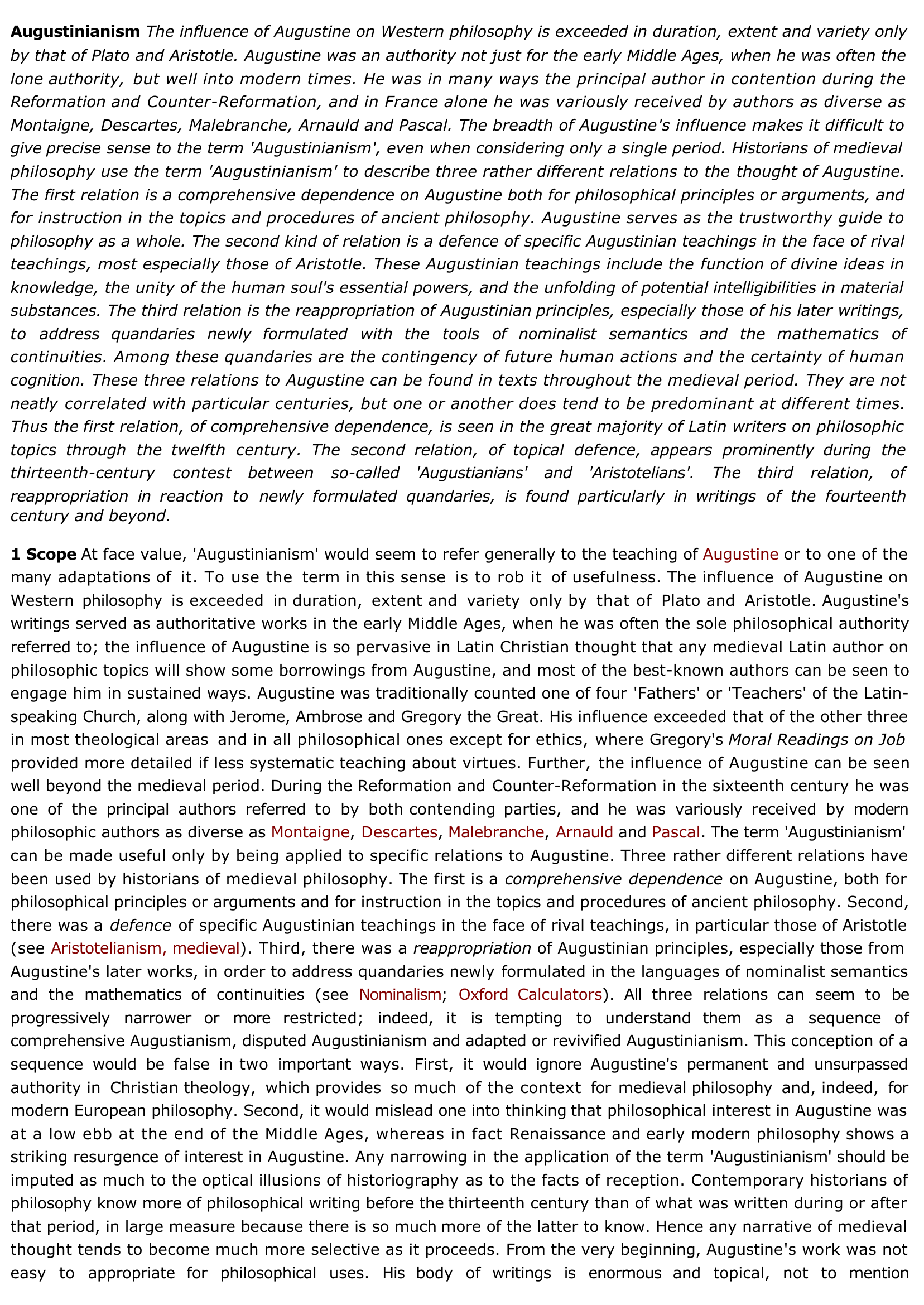Augustinianism
Extrait du document
«
Augustinianism The influence of Augustine on Western philosophy is exceeded in duration, extent and variety only
by that of Plato and Aristotle.
Augustine was an authority not just for the early Middle Ages, when he was often the
lone authority, but well into modern times.
He was in many ways the principal author in contention during the
Reformation and Counter-Reformation, and in France alone he was variously received by authors as diverse as
Montaigne, Descartes, Malebranche, Arnauld and Pascal.
The breadth of Augustine's influence makes it difficult to
give precise sense to the term 'Augustinianism', even when considering only a single period.
Historians of medieval
philosophy use the term 'Augustinianism' to describe three rather different relations to the thought of Augustine.
The first relation is a comprehensive dependence on Augustine both for philosophical principles or arguments, and
for instruction in the topics and procedures of ancient philosophy.
Augustine serves as the trustworthy guide to
philosophy as a whole.
The second kind of relation is a defence of specific Augustinian teachings in the face of rival
teachings, most especially those of Aristotle.
These Augustinian teachings include the function of divine ideas in
knowledge, the unity of the human soul's essential powers, and the unfolding of potential intelligibilities in material
substances.
The third relation is the reappropriation of Augustinian principles, especially those of his later writings,
to address quandaries newly formulated with the tools of nominalist semantics and the mathematics of
continuities.
Among these quandaries are the contingency of future human actions and the certainty of human
cognition.
These three relations to Augustine can be found in texts throughout the medieval period.
They are not
neatly correlated with particular centuries, but one or another does tend to be predominant at different times.
Thus the first relation, of comprehensive dependence, is seen in the great majority of Latin writers on philosophic
topics through the twelfth century.
The second relation, of topical defence, appears prominently during the
thirteenth-century
contest
between
so-called
'Augustianians'
and
'Aristotelians'.
The
third
relation,
of
reappropriation in reaction to newly formulated quandaries, is found particularly in writings of the fourteenth
century and beyond.
1 Scope At face value, 'Augustinianism' would seem to refer generally to the teaching of Augustine or to one of the
many adaptations of it.
To use the term in this sense is to rob it of usefulness.
The influence of Augustine on
Western philosophy is exceeded in duration, extent and variety only by that of Plato and Aristotle.
Augustine's
writings served as authoritative works in the early Middle Ages, when he was often the sole philosophical authority
referred to; the influence of Augustine is so pervasive in Latin Christian thought that any medieval Latin author on
philosophic topics will show some borrowings from Augustine, and most of the best-known authors can be seen to
engage him in sustained ways.
Augustine was traditionally counted one of four 'Fathers' or 'Teachers' of the Latinspeaking Church, along with Jerome, Ambrose and Gregory the Great.
His influence exceeded that of the other three
in most theological areas and in all philosophical ones except for ethics, where Gregory's Moral Readings on Job
provided more detailed if less systematic teaching about virtues.
Further, the influence of Augustine can be seen
well beyond the medieval period.
During the Reformation and Counter-Reformation in the sixteenth century he was
one of the principal authors referred to by both contending parties, and he was variously received by modern
philosophic authors as diverse as Montaigne, Descartes, Malebranche, Arnauld and Pascal.
The term 'Augustinianism'
can be made useful only by being applied to specific relations to Augustine.
Three rather different relations have
been used by historians of medieval philosophy.
The first is a comprehensive dependence on Augustine, both for
philosophical principles or arguments and for instruction in the topics and procedures of ancient philosophy.
Second,
there was a defence of specific Augustinian teachings in the face of rival teachings, in particular those of Aristotle
(see Aristotelianism, medieval).
Third, there was a reappropriation of Augustinian principles, especially those from
Augustine's later works, in order to address quandaries newly formulated in the languages of nominalist semantics
and the mathematics of continuities (see Nominalism; Oxford Calculators).
All three relations can seem to be
progressively narrower or more restricted; indeed, it is tempting to understand them as a sequence of
comprehensive Augustianism, disputed Augustinianism and adapted or revivified Augustinianism.
This conception of a
sequence would be false in two important ways.
First, it would ignore Augustine's permanent and unsurpassed
authority in Christian theology, which provides so much of the context for medieval philosophy and, indeed, for
modern European philosophy.
Second, it would mislead one into thinking that philosophical interest in Augustine was
at a low ebb at the end of the Middle Ages, whereas in fact Renaissance and early modern philosophy shows a
striking resurgence of interest in Augustine.
Any narrowing in the application of the term 'Augustinianism' should be
imputed as much to the optical illusions of historiography as to the facts of reception.
Contemporary historians of
philosophy know more of philosophical writing before the thirteenth century than of what was written during or after
that period, in large measure because there is so much more of the latter to know.
Hence any narrative of medieval
thought tends to become much more selective as it proceeds.
From the very beginning, Augustine's work was not
easy to appropriate for philosophical uses.
His body of writings is enormous and topical, not to mention.
»
↓↓↓ APERÇU DU DOCUMENT ↓↓↓

































